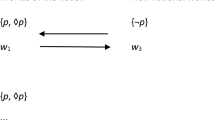Abstract
In this paper, I will defend modalfictionalism. The paper has two parts. In thefirst part, I will suggest a revised version ofmodal fictionalism which can avoid certaintechnical problems. In the second part, I willpropose a nominalized version of modalfictionalism and a general scheme offictionalism for the nominalist.
Similar content being viewed by others
REFERENCES
Armstrong, D.M. (1989): A Combinatorial Theory of Possibility, Cambridge: Cambridge University Press, Cambridge.
Bricker, P. (1996): ‘Isolation and Unification: The Realist Analysis of Possible Worlds’, Philosophical Studies 84, 225–238.
Bricker, P. (2001): ‘Island Universes and the Analysis of Modality’, in G. Preyer and F. Siebelt (eds.), Reality and Humean Supervenience: Essays on the Philosophy of David Lewis (pp. 27–55). Oxford: Rowman & Littlefield.
Brock, S. (1993): ‘Modal Fictionalism: A Response to Rosen’, Mind 102(405), 147–150.
Divers, J. (1999): ‘A Modal Fictionalist Result’, Nous 33(3), 317–346.
Field, H. (1980): Science without Numbers, Princeton: Princeton University Press.
Field, H. (1989): Realism, Mathematics and Modality, Oxford: Blackwell.
Hazen, A. (1979): ‘One of the Truths about Actuality’, Analysis 39(1), 1–3.
Lewis, D. (1968): ‘Counterpart Theory and Quantified Modal Logic’, Journal of Philosophy 65, 113–126.
Lewis, D. (1986): On the Plurality of Worlds, Oxford: Basil Blackwell.
Lewis, D. (1992): ‘Armstrong on Combinatorial Possibility’, Australasian Journal of Philosophy 70, 211–224.
Nolan, D. (1997): ‘Three Problems for “Strong” Modal Fictionalism’, Philosophical Studies 87, 259–275.
Noonan, H. (1994): ‘In Defence of the Letter of Fictionalism’, Analysis 54(3), 133–139.
Parfit, D. (January 1998): ‘Why Anything?Why This?’, London Review of Books, 2–9.
Rosen, G. (1990): ‘Modal Fictionalism’, Mind 99(395), 327–354.
Rosen, G. (1993): ‘A Problem For Fictionalism About PossibleWorlds’, Analysis 53(2), 71–81.
Rosen, G. (1995): ‘Modal Fictionalism Fixed’, Analysis 55(2), 67–73.
Unger, P. (1984): ‘Minimizing Arbitrariness: Toward a Metaphysics of Infinitely Many Isolated ConcreteWorlds’, Midwest Studies in Philosophy 9, 29–51.
Vision, G. (1993): ‘Fiction and Fictionalist Reduction’, Pacific Philosophical Quarterly 74, 150–174.
Author information
Authors and Affiliations
Rights and permissions
About this article
Cite this article
Kim, S. Modal Fictionalism Generalized and Defended. Philosophical Studies 111, 121–146 (2002). https://doi.org/10.1023/A:1021202427372
Issue Date:
DOI: https://doi.org/10.1023/A:1021202427372



